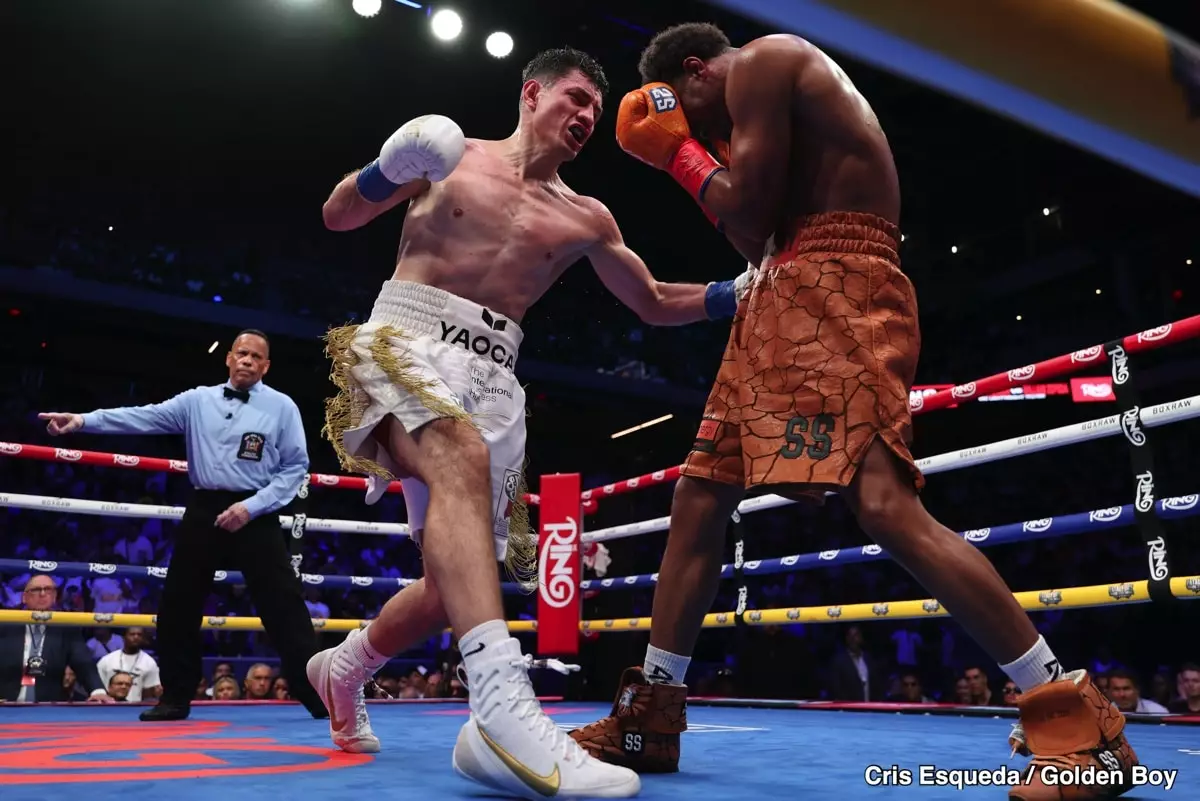In a thrilling display of skill and power, Hamzah Sheeraz etched his name in the spotlight with a commanding fifth-round knockout over Edgar Berlanga. This fight was not merely about winning; it was an emphatic statement of Sheeraz’s potential to ascend the ranks of the super middleweight division. From the outset, the match hinted at complexity—Sheeraz, known for his ferocity, endured a slow start, perhaps reflecting the cautious approach of a fighter respecting his opponent’s resilience. However, the turning point arrived in the fourth round, where Sheeraz unleashed a blistering four-punch barrage that visibly shifted the momentum. His quick and precise combination caught Berlanga off guard, culminating in a knockdown that proved decisive.
What stands out about this victory is the way Sheeraz capitalized on vulnerability. When Berlanga rose, visibly shaken and wobbly, Sheeraz didn’t hesitate. His relentless pursuit to finish the fight underscored a fighter’s confidence and desire to make a statement. The subsequent barrage in the fifth round, which forced the referee to halt the bout at just 17 seconds into the round, demonstrated Sheeraz’s aggressive mindset and ability to seize opportunities when presented. His victory is not just a testament to his technical prowess but a reflection of his readiness to challenge the elite—questioning if he will stand toe-to-toe with the likes of Canelo Alvarez in the future highlights his ambition and belief in himself.
Judicial Controversy and the Perception of Bias
While Sheeraz’s dominance was clear, the undercard’s judging decisions called into question the fairness of the boxing scene. Shakur Stevenson’s win over William Zepeda, awarded via a wide unanimous decision, sparked debate. Zepeda, arguably the busier and more aggressive fighter, landed more punches and imposed pressure throughout the fight. Yet, the judges’ scorecards—118-110, 118-110, and 119-109—created an impression of favoritism towards Stevenson, often regarded as the ‘house fighter’. This disparity between public perception and official scoring casts a shadow over the integrity of sanctioned bouts, fueling suspicions about bias and the need for reform in judging practices.
The evident favoritism undermines the sport’s credibility, especially when fighters like Zepeda, who clearly outwork their opponents, receive lower scores. It is a stark reminder that boxing isn’t merely about skill and grit but also hinges on perception and the integrity of judges. Such controversies diminish the achievements of fighters who deliver compelling performances but are denied rightful recognition due to subjective scoring biases. The sport’s credibility rests on transparent, fair evaluations—anything less undermines its essence and frustrates both fighters and fans alike.
The Fight for Respect and the Reality of Judging Bias
Another pivotal point emerging from recent bouts involves the persistent issue of unfair scoring and biased officiating, which often influence fighters’ careers and the sport’s overall reputation. For example, Subriel Matias’s gritty unanimous decision over Alberto Puello highlighted how relentless pressure and aggressive fighting can sometimes be overshadowed by crowd and judge predispositions. Despite the constant holding and frustrating tactics employed by Puello, the judges awarded the victory to Matias, acknowledging his the constant offensive pressure.
This fight underscores a critical insight: modern boxing remains a complex interplay between talent, strategy, and the often unpredictable nature of judging. Boxer’s performances should not be diminished due to strategic fouling or holding, yet unfortunately, such tactics frequently sway decisions. Moreover, the looming decision of Matias to defend his WBC title against Dalton Smith signals the vibrant, competitive spirit that defines today’s boxing scene—yet, it also prompts reflection on how much of fighters’ success hinges on subjective scoring rather than domination.
Throughout these bouts, one thing is clear: the sport desperately needs a paradigm shift. If boxing is to preserve its reputation as a true test of skill and resilience, transparency and consistency in judging must improve. Without it, fighters will continue to face unjust obstacles, and fans’ faith in the sport’s fairness will erode. The recent fights serve as a wake-up call—boxing’s future depends on credibility, clarity, and unwavering fairness. Only then can fighters truly be judged on merit, and boxing can reclaim its rightful place as a sport of authentic athletic competition.

